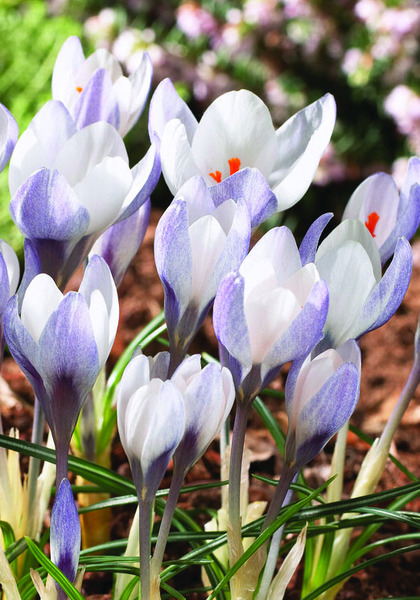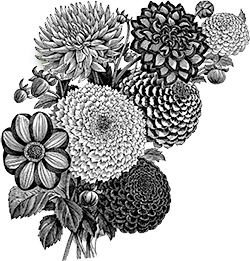|
|

 
|
|
This magical variety of C. biflorus, or Scotch crocus, has outer petals of light violet and silvery-white centers with a lilac blush. These diminutive sprites bloom early and naturalize well where happy. 3-4”, zones 4a-7b(8bWC), from Holland. |
|
TYPE C. biflorus ZONES 4a-7b(8bWC) HEIGHT 3-4” BLOOM SEASONS very early spring SOURCE Holland LIGHT full sun, half sun, dappled, light shade |
PLANTING & CAREFor best growth and bloom, plant crocus as soon as the soil cools in the fall, giving them as long as possible to establish roots before soil freezes completely. If absolutely necessary, store briefly in open bags in a cool, dry spot. Choose a site with well-drained soil (avoid or improve clay soil). Though crocus prefer neutral to slightly alkaline soil, they are very adaptable. Plant in full sun to very light shade. Crocus often do well in the dappled shade of deciduous trees and shrubs or around the base of perennials such as peonies because they can complete most of their life cycle before these plants leaf out fully and limit their sun. Though it’s never the first place we recommend, in the right conditions some varieties can do well in lawns. For helpful advice from our customers and the Missouri Botanical Garden, see our “Crocus in the Lawn” page. Plant with the growing tip up. For SNOW OR SPECIES CROCUS, plant with the base 2-3 inches deep and 2-3 inches apart from center to center (or closer for a lush look). For TRADITIONAL CROCUS, plant with the base 3-4 inches deep and 3-4 inches apart from center to center (or closer for a lush look). Scratch a little bulb fertilizer into the surface soil (slow-release 10-10-10 is ideal). Water and make sure the soil stays reasonably moist from fall through spring. During the summer, however, crocus do better if the soil is dry. If animals dig your newly-planted bulbs, try covering them for a couple of weeks with chicken wire, plastic-mesh netting, old screens, etc. An airy mulch of straw, etc., can be helpful the first winter, but remove it in earliest spring. Do NOT apply a thick mulch of shredded bark, etc. After bloom, allow the foliage to yellow completely (to feed the bulbs for increase and future bloom) before removing. Learn more about growing and enjoying crocus in our Crocus Newsletter Archives. |

|
SPRING
|
· |
SUMMER
|
· |
FALL
|
· |
LEARN MORE
|
· |
ORDERING
|

|










